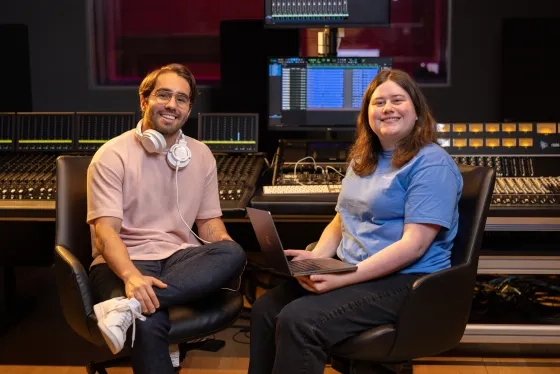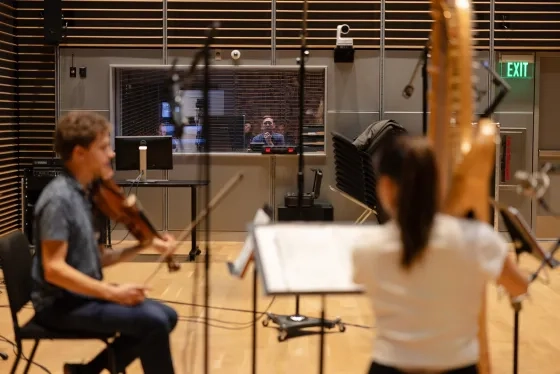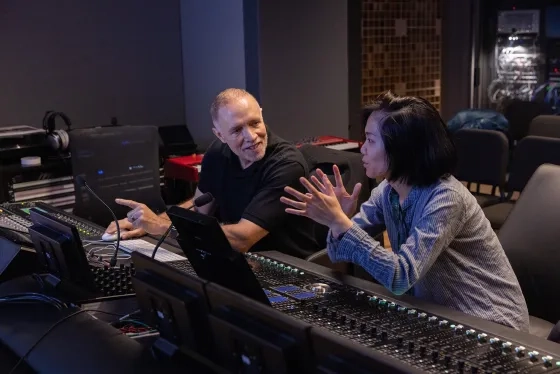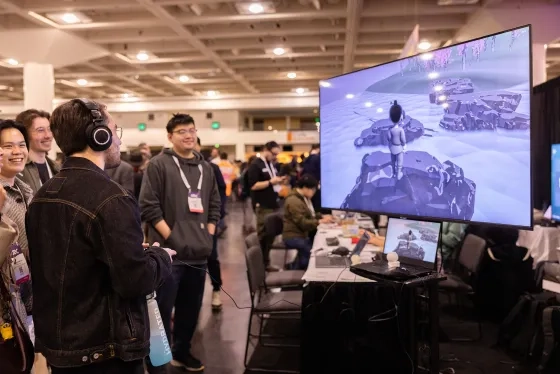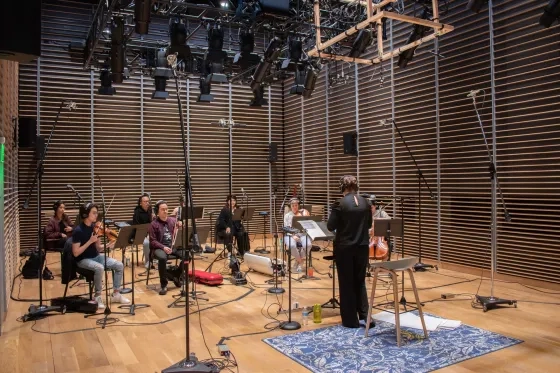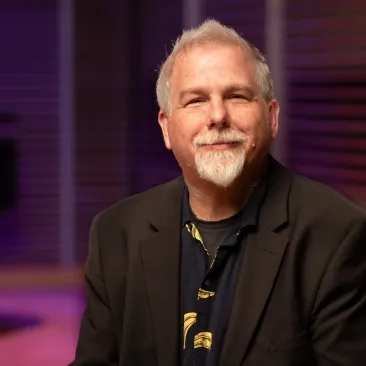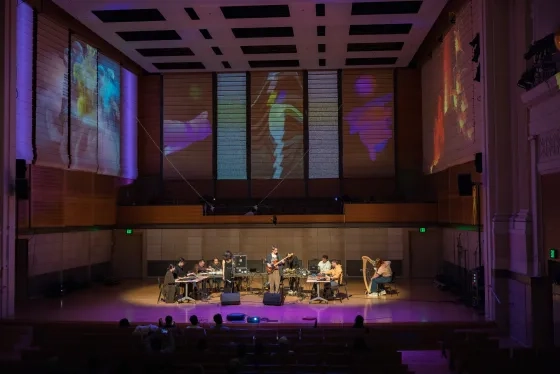A Decade of Dedication: Technology and Music Composition Program Celebrates Ten Years
In 10 years, SFCM's Technology and Applied Composition program has pushed the boundaries of what is possible in music technology, with graduates working as successful film and game scorers, music producers, sound engineers, and recording artists.
In a decade, SFCM’s Technology and Applied Composition (TAC) program has transformed from a bold experiment into a powerhouse of innovation redefining the future of music technology one graduate at a time.
“It’s like a playground for composers,” said student Caroline Feitosa (‘25). “You get to learn everything about composing, technology, sound design, every aspect of audio and music and technology.”
Announced in 2014, and launched in 2015, the TAC curriculum integrated traditional composition with music technology to develop a new generation of composers adept in the fields of concert music, sound design, and film and video game scoring.
“I would describe the program when we started as a fun little experiment,” said Professor and composer Lennie Moore, who has been with the program since its inception with then-Executive Director MaryClare Brzytwa and a handful of students. “I feel really honored to have been part of this since the beginning.”
“Initially it was exposing students to a wide range of skill sets in technology,” Moore added. “We are still doing that, but more, more pathways, more options.”
Today, TAC gives students a direct path into the worlds of film and video game scoring, live performance, emerging new media, sound design, popular music production, artist development, and everything in between. “There are layers and layers of different kinds of disciplines that are part of this art practice, that is what a modern creator does,” Moore said.
In a decade, the program has grown exponentially, celebrating more than 100 graduates in 2023. But as the curriculum has become even more diverse, it continues to cater to the professional interests of the students as they near graduation.
“First, I always ask, what are you most interested in?” said Executive Director Steven Horowitz. Under his leadership the TAC program has developed new educational tracks for students including Film Scoring, Game Scoring, and Composer-Performer, in total adding more than seven new classes in less than a year. In 2025 the number of expected graduates will reach 150 trained entrants in the game, film, and audio design industries.
“We want every student to understand the art of composition, but at the same time we want them to understand the art of production, the art of mixing, the art of recording, the art of engineering,” Horowitz continued. “This is one of the most innovative and unique programs that you’ll find anywhere in the world.”
In addition to leveling up in curriculum, the TAC program has ongoing and growing partnerships, including with Sony—in which students work with Sony professionals to score a video game as a keystone project each semester, and SFFILM, where students get real world experience working on all aspects of film sound, from composition, to editing, to mixing and post-production. “When you're here, we give you the opportunity to actually work on real films with real directors,” Horowitz added. In a new partnership with KDFC Classical California, TAC students also help bring video game soundtracks to life, while developing real-world sound engineering and recording skills.
Along with curriculum and collaboration the addition of SFCM’s Bowes Center, inaugurated in 2021, multiplied opportunities for TAC students. The building includes multiple new labs, classrooms, and workstations, as well as Studio G, a state-of-the-art sound stage and performance venue so impressive that it caught the attention of the Recording Academy for a GRAMMY listening event.
“Personally, I love when I’m here in the studio creating something,” said student Manuel Calderon (‘25). “When I saw the Bowes Center, Studio H and Studio G, all the pods, all the labs, it was amazing,” Calderon continued. “One of the best things for me was getting into this program.”
Graduates of the TAC program are working at companies like Playstation, Meta, Electronic Arts, Ubisoft, and Apple. They are also scoring movies, video games, Super Bowl commercials, and working as sound designers and recording engineers. “The education that TAC provided for me is invaluable: 90% of what I do I got from here,” said alumna Daria Novo, who graduated from the program in 2017. “I was one of the lead orchestrators of the Netflix television show One Piece,” Novo continued, “and I actually brought some TAC students to help me with that.”
“After you graduate you can go into so many different professions: You can become a composer, you can become an orchestrator, you can become a sound designer, mixing engineer, music technologist, music coding, anything!” Novo added.
In addition to skill building, the community of music makers is one of creativity and friendship. “We are all about building engaged musicians,” Horowitz continued. “Our students and teachers work together, share ideas and support each other. You will make lifelong friends and connections that will help for the rest of your career.”
The hands-on approach and diverse development of skills is one of many things that attracted students like Feitosa. “I wanted to try it all,” she says. “There are a lot of music programs that are like, ‘Oh you want to be a music producer? Do this. You want to be a guitarist? Do this,’ but this lets me try everything.”
After graduating, Feitosa plans on achieving her dream of being a film composer, and now feels duly prepared to take on the industry: “I came here with no experience and no knowledge, and I feel like I am leaving with a lot of both so I am very grateful.”
“What we are doing at the end of the day is producing students that are not only well-rounded, but are able to go out and be thought leaders at the forefront of their field,” Horowitz added.
As the TAC program pauses to celebrate a decade of innovation, it won’t sit still for long. “The landscape of this field is changing every day.” Horowitz said. “And we’ll be at the forefront of it. The future for TAC is really bright, and I am really excited about it.”
Horowitz plans on taking the program, and its technology-loving musicians, even further into the future, with a curriculum that has a proven track record of turning boundary-pushing ideas into industry-shaping careers, proving that the future of music is being composed right now.
Learn more about Technology and Applied Composition at SFCM

